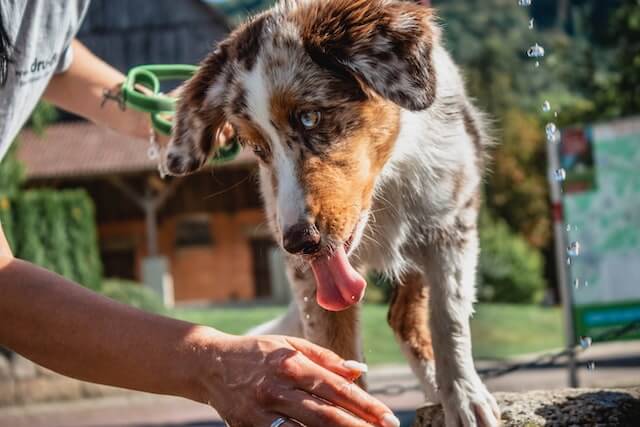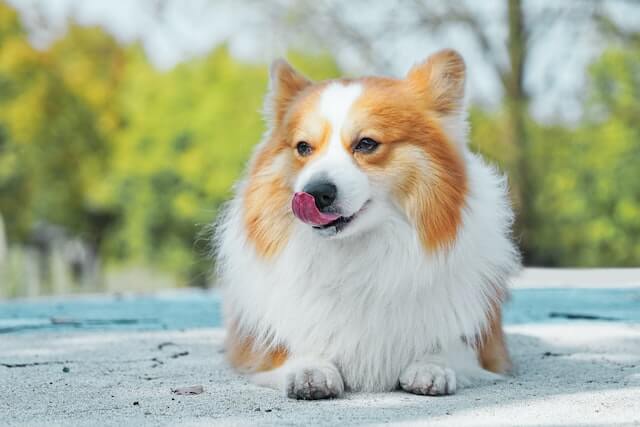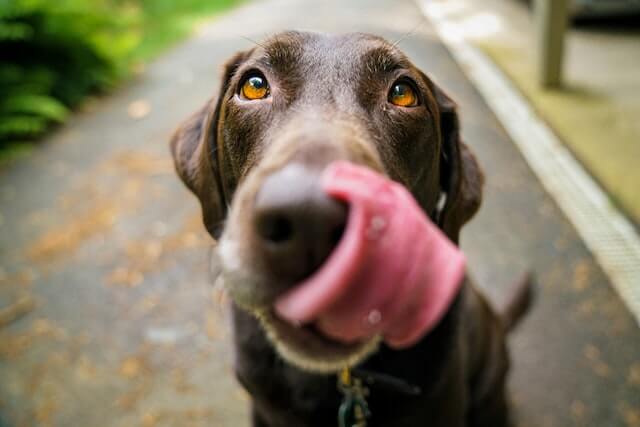Lip-smacking and lip-licking can occur for a variety of reasons. It may be common due to anxiety and nervousness, or a symptom of a serious health problem. The cause for concern is the persistent nature of this habit, which distinguishes the manifestation of simple reflexes (hunger, thirst) from a possible health problem.
Let’s look at the many reasons why your dog is smacking his lips and how you can help him.
Causes
Smacking and licking is basically a movement of the mouth and lips that make a noise. You may find the sound cute and adorable or annoying and upsetting. Whatever your reaction, it is essential to know the cause.
Specialists have identified 3 groups of causes that determine frequent lip-smacking urges in dogs.
I. Natural occurrences
Physiological reactions are natural manifestations of the body that are not life-threatening for the pet. These include:
- Hunger
Salivary glands begin to secrete secretions intensively and swallowing becomes more frequent as a reflex. Dogs react to smells, sounds of cooking, and thoughts of feeding. Saliva forms in their mouths while they are waiting. The dog smacking lips, dog licking lips, moving his tongue sideways to keep the saliva from coming out of his mouth. This is a natural reaction that will stop as soon as the dog is fed.
- Thirsty
Dog constantly licking lips, indicating a lack of moisture. Sometimes owners forget to fill the water bowl, which is very dangerous. The consequence is dehydration. Sometimes thirst serves as a sign of illness, so it is worth observing the pet and noting additional symptoms. Licking and smacking, especially in the heat, indicate the pet’s need for moisture. Refusal or low fluid intake may indicate a serious illness. For dogs suffering from chronic diseases, only filtered water is recommended.
- Physiological characteristics of the breed
For instance, Saint Bernards and Newfoundlands have many folds near the mouth in which moisture accumulates. This condition is called false hyper-salivation. The animal is constantly licking to remove excess fluid.

II. Psychological causes
Dog lip-smacking can also be a behavioral response to certain stimuli after exposure to stressors (fright, anxiety, impatience, loneliness). This is associated with increased activity, so saliva is produced more frequently. Sometimes from a particularly strong excitement, the dog begins to muffle.
III. Pathological causes
After excluding the above factors, only diseases and various disorders in the body remain:
- Oral diseases and dental problems
For example, stomatitis, caries, gingivitis, periodontal disease, sialocele, and xerostomia. Frequent swallowing of saliva is associated with a change in its taste. There is also an unpleasant odor coming out of the mouth, which is due to the development of an infection. Dogs have no way of telling you they have a broken tooth or sore gums. So they smacking and licking lips a lot, drool and dog making weird mouth movements. If your dog has this behavior, he may need a dental cleaning to get rid of the lip-smacking and drooling.
- Sialocele – occurs when the salivary glands become swollen or infected. This causes saliva to drain into the mouth. Your dog will smack his lip to move his saliva. Your dog’s salivary glands are located under the tongue. Open your mouth and gently lift your tongue. If you notice swollen bumps, you need to take your dog to the vet.
- Xerostomia (dry mouth) is the opposite of sialocele. It is extremely uncomfortable for the dog. Lack of saliva can cause lip smacking because the dog is trying to produce saliva. This is unusual in a healthy dog but can occur in older dogs, especially those undergoing cancer treatment. Additional fluids and mouthwashes are used during treatment.
- Canine stomatitis is when the mucous membranes of the mouth become inflamed. It can cause swelling of the gums and sores along the gum line, especially on the inside of the lips. This problem can develop in any breed but is common in greyhounds as well as Maltese, Schnauzers, and Labradors. It is an immune system dysfunction that causes the gums to react severely to plaque.
Regular dental checkups by a veterinarian are especially important!
- Liver and kidney disease
Insufficiency, bladder stones, portacaval (hepatic) shunt. In the early stages, other symptoms do not appear. Therefore, it is necessary to pay attention to the behavior of the pet, the frequency of urination and the color of urine, and the amount of water consumed.
- Allergy
Causes – a change of diet, poor quality food, intolerance to components. Additional signs: redness, rashes, itching, swelling, fever and dog sounds congested.
A decrease in the quality of food or an unfamiliar (e.g., diet) diet can be quite painful for the pet. Experienced breeders and dog breeders warn that a change of food should be introduced gradually, over a period of time.
- Intoxication
Causes: chemicals, spoiled food, medications, chocolate, plants. Manifested by lip smacking, vomiting, digestive upset, weakness, decreased temperature, and cramps.
Sometimes lip-smacking is a warning that your dog has ingested something toxic. Did you know that many houseplants and landscape plants can be toxic or poisonous to dogs? Dieffenbachia, also known as blunt cane, causes lip smacking, drooling, and swelling of the mouth. Other common houseplants such as aloe vera, cyclamen, jade, and sage palm are unsuitable for dogs!

- Ketosis is a complication of late pregnancy
It is manifested by hypersalivation, heartburn, nausea, and teeth grinding.
- Entry of a foreign object into the digestive tract
Muffling of the lips, constant licking, depressed mood, nausea, and lack of appetite may indicate that there is a foreign object in the dog’s digestive system. The pet may have swallowed something while playing with a stick outside or it could be any other small object accidentally dropped in the house. If it doesn’t come out naturally, it can get stuck in the teeth or clog the intestines. In such cases, it is best to consult a veterinarian for advice.
In addition to an object lodged in the dog’s mouth, the dog may be playing with insects that may bite it. In this case, rinse your dog’s mouth with cold water or give him ice cubes to chew on. Watch for allergic reactions and call the vet if there is an abnormal swelling or your dog has trouble breathing.
- Digestive ailments
If your dog has stomach problems (e.g., gastritis, heartburn, hyperacidity) he also suffers from heavy salivation, smacking, and dog keeps licking lips. The acidity increases and the saliva takes on an unpleasant taste, causing the animal to try to reduce the discomfort and swallow his saliva more often.
- Bacterial infections
Germs can enter the pet’s body from an unwashed bowl, tainted food, or water.
- Heat or sunstroke

IMPORTANT! Serious pathologies such as rabies, botulism, and tetanus are particularly dangerous. They have a high mortality rate.
Conclusion
The dog smacks his mouth for many reasons, the main thing is not to panic. Often these are manifestations of normal physiological reactions. Proper evaluation of the pet’s condition will help to avoid serious consequences and complications.
Before going to the vet, it is worth observing the pet for some time for additional symptoms. This will help the veterinarian to make a diagnosis.
The information needed is the pet’s contact with poisonous plants, recent use of medications, and being near chemical sprays. You can perform an examination by examining the mouth, eyes, and muzzle for bites, lumps, lesions, and burns. If you find abnormalities, or severe symptoms (weakness, exhaustion, vomiting, fever, and others) be sure to contact a veterinarian who will prescribe the necessary treatment.
